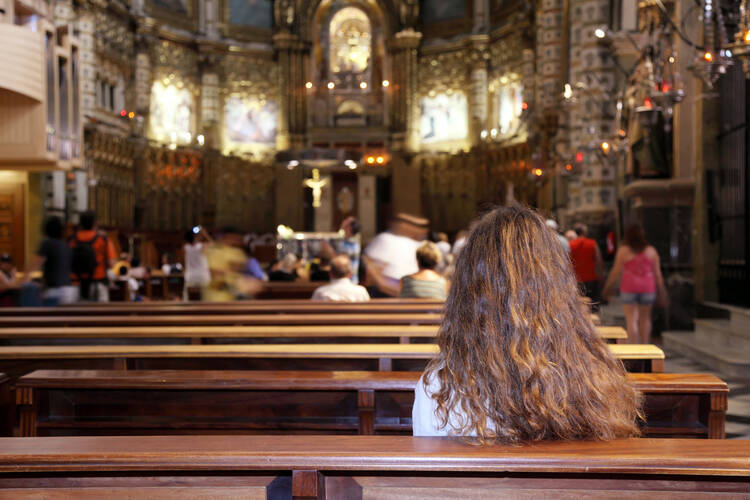Oct. 25 was my 23rd birthday, a Wednesday, which I celebrated working at my desk in the America newsroom. The pope had given an intervention at the synod decrying clericalism as a “whip…a scourge…a form of worldliness that defiles and damages the face of the Lord’s bride.”
My colleague Colleen Dulle wrote on Twitter that Francis’ intervention implied clericalism’s particular hurt to women who are “continu[ing] with patience and humility, enduring the contempt, mistreatment and marginalization from institutionalized clericalism.”
Twenty minutes later, we heard that the Rev. Marko Rupnik, a credibly accused sexual abuser and former Jesuit, had been incardinated in his home diocese in Slovenia. The diocese put out a statement explaining that for now “Rupnik enjoys all the rights and duties of diocesan priests.”
My first thought: “Why do I, a young woman and a feminist, stay in a church mired in scandal?”
Two days later, on Oct. 27, the Vatican admitted that there were “serious problems in the handling of the Fr. Marko Rupnik case” and lifted the statute of limitations on his alleged abuses to allow a review process to take place. That is all well and good—I pray that justice is done—but it does not change the fact that Father Rupnik’s case is an all-too-familiar instance of the ugliest kind of clericalism.
Far more harmful than young priests trying on lace surplices and cassocks, which the pope included in his intervention at the synod, clerical sexual abuse and our church’s failure to stamp it out is a threat to the legitimacy of the church for future generations. It is also a threat to the church’s mission today.
Clerical sexual abuse and our church’s failure to stamp it out is a threat to the legitimacy of the church for future generations.
For young Catholics, the sexual abuse crisis has always loomed close.
In May of this year, my best friend from my Jesuit high school sent me a 696-page report released by the Illinois attorney general about clerical sexual abuse in my home state. My first instinct was to type in the name of my school. Twenty cases of priests with credible abuse allegations who worked at my high school appeared; six of those cases occurred at the school itself.
I was heartbroken by each instance of abuse, each act of violence and manipulation that took place in the school I had come to know so intimately. Yet, although I was devastated, I ought not be surprised. After all, a church stained by scandal is all I have ever known.
None of those 20 Jesuits ever taught at St. Ignatius while I was there; many died before I was born. Nevertheless, as I scrolled through the report, above me loomed the reality of sexual abuse in my church.
St. Ignatius is the school where I first began to forge a relationship with God. That place, and the church more broadly, inspired my love of theology; it is where I first began to glimpse my vocation as a writer. Even amid all this brokenness, both St. Ignatius and the Catholic Church are holy places to me. Because I love them, I must fight for them to be better.
Even amid all this brokenness, both St. Ignatius and the Catholic Church are holy places to me. Because I love them, I must fight for them to be better.
Listen to victims.
Addressing a problem deeply rooted in the clerical structure of the church demands that the laity, including women religious, be part of the solution. It is our duty as a church to listen to survivors and let their testimony guide us, even (and especially) when it makes us uncomfortable.
In September, former members of the Loyola Community (the Slovenian women’s religious community whose members Father Rupnik is accused of abusing) released a statement decrying the Diocese of Rome’s report on the Centro Aletti, the art and theology school Father Rupnik founded. They argue the report “ridicules the pain of the victims, but also of the whole church, mortally wounded by such blatant hubris.”
The women also lamented Pope Francis’ September meeting with Centro Aletti director Maria Campatelli: “That meeting granted by the pope to Campatelli in such a friendly atmosphere was thrown in the faces of the victims (these and all victims of abuse); a meeting that the pope denied them.”
After Pope Francis reopened the Rupnik case, the women described it as “an appropriate step for the truth to be recognized.” But it has taken far too long for these victims’ voices to be heard.
In an interview translated by The Pillar, an Italian former religious sister going by the pseudonym “Anna” detailed how Father Rupnik abused his role as her spiritual guide in Slovenia and Rome. She said that he manipulated her faith to coerce her into sexual acts. When she threatened to complain, Anna said, Father Rupnik replied: “Who would believe you? It’s your word against mine: If you talk, I’ll make you look like a lunatic.”
Anna alleges that when she went to Father Rupnik’s spiritual advisor, Tomas Spidlik, S.J., he refused to hear her confession and even drafted a letter for Anna to be released from her vows as a religious sister. In 1994, Anna brought a request for the dispensation of vows—which included a denunciation of Father Rupnik’s abuse—to the archbishop of Ljubljana. In 1995, Father Rupnik was appointed director of Centro Aletti.
Not only should victims be heard; as a church, we should aim to be transformed by their testimonies and the spirit of truth working within us.
The sexual abuse crisis can only be addressed if the church experiences metanoia.
It is a vicious clericalism that protects credibly accused abusers over the people they are ordained to serve. To address this, ordained and lay leadership should share responsibility for overseeing the sexual abuse crisis. In a 2020 piece in The New York Times, Elizabeth Bruenig observed that perhaps the Vatican report on the investigation into ex-Cardinal Theodore McCarrick is “as remarkably unflinching as it is precisely because it was written by a layperson.” Ms. Bruenig wrote that “lay participation in accountability processes is crucial, because laypeople provide a perspective less entwined with the interests of the church hierarchy, and because trust and transparency are sorely lacking in the church.” Allowing greater lay oversight provides a new perspective to address what is broken in our church.
The final report from the Synod on Synodality includes a proposal to allow women to judge all levels of canonical disputes. This is a strong start. However, laypeople cannot be true collaborators in the church’s mission if the church does not hold clerics accountable for such grave violations of their authority.
As my colleague, Molly Cahill, wrote in 2020, “The very language that attempts to empower lay leadership should not also be used to let the current clerical leadership of the church off the hook.” Increasing lay oversight cannot be effective without a hierarchy willing to use its power to address these gaping wounds in our church.
Not only should victims be heard; as a church, we should aim to be transformed by their testimonies and the spirit of truth working within us. The forgiveness Christ preached from his cross is not some abstract sense of mutual goodwill. It is a restoration of right relationship. We need metanoia: repentance, a change of heart and mind.
It is a spiritual sickness that has allowed the rot of sexual abuse to fester within God’s church. Any structural changes we make will be insufficient if our hearts are not changed as well. The question posed by Pope Francis in his 2013 homily at Lampedusa about migrants is pertinent to the sexual abuse crisis as well: “Has any one of us wept because of this situation and others like it?”
In this holy and broken church there exists a spirit in whose veracity I have unwavering faith.
Why I stay
In my darkest moments of doubt, I sometimes wonder if the critics are right—if my place as a young feminist in the church is nothing more than a kind of Stockholm Syndrome. Have I fallen in love with the very thing that is holding me captive? Friends have told me that learning about the insidious reality of sexual abuse destroyed their faith in the church. Although it breaks my heart that they have left the church, I cannot entirely blame them. It has shaken my faith, too.
But I stay—because after those dark moments, I think of how the church has given me sacred glimpses of the spirit of truth, “which the world cannot accept, because it neither sees nor knows it” (Jn 14:17). I am reminded that, even amid great evil that obstructs that sacred truth, there is something here. In this holy and broken church there exists a spirit in whose veracity I have unwavering faith.
It is the actions of flawed human beings that make me question whether I belong in this church; it is the voice of God that lovingly calls me back to it. I dream of a church that works for justice in the world. The work of making that dream real must start by promoting justice within our own four walls.








